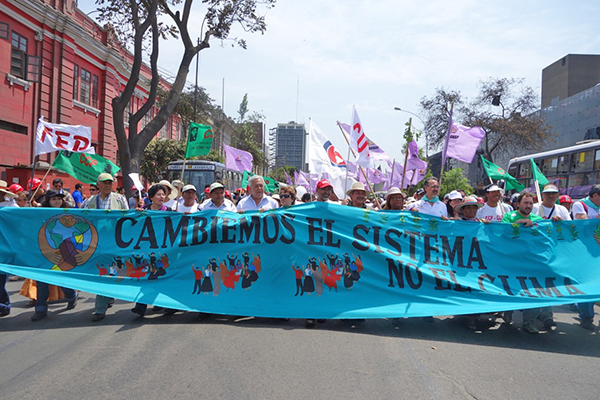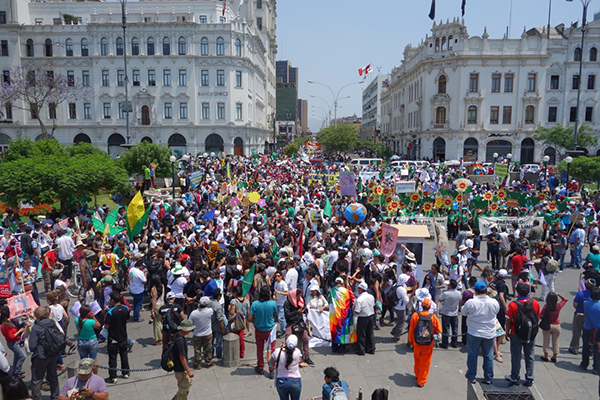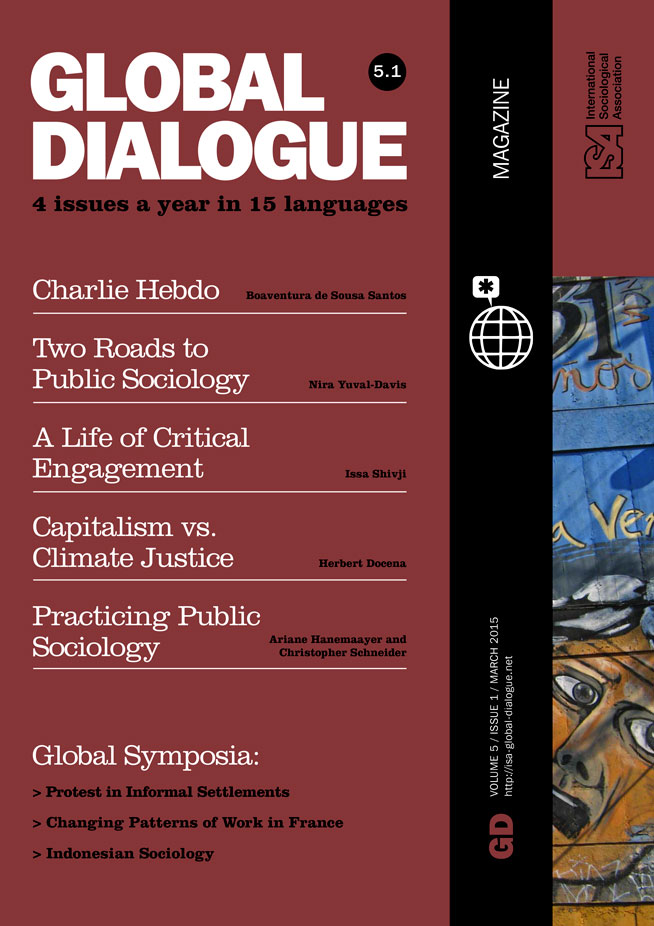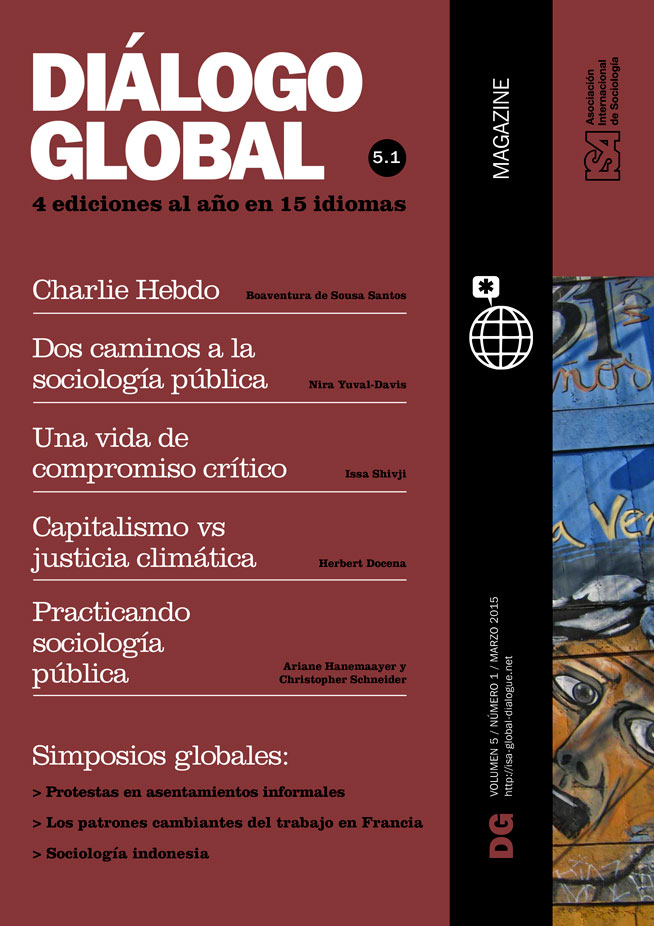Capitalism vs. Climate Justice

February 22, 2015
As has become traditional since 1972, when the first UN conference on the environment was held in Stockholm, thousands of people from around the world once again gathered for an alternative “People’s Summit” in December (2014). They marched on the streets of Lima (Peru) while hundreds of state representatives met inside a military camp for the latest Conference of Parties (COP) of the UN Framework Convention on Climate Change.
The calls from the “People’s Summit” varied as usual. Some waved colorful placards saying, “We call for a serious climate change law!” or “No more speeches, act!” – demands which suggest that there is or could be a harmony of interests between those marching and those meeting at the official conference some fourteen kilometers away, and that the latter could really pass a “serious climate change law” under the existing system.
But the more common demand I heard – indeed, the call expressed on the central banner behind which all marched – was “Change the System not the Climate!,” along with variations, such as “Save the planet from capitalism!,” and other such statements as “Capitalists: Murderers!” or “COP: Nest of Predators” – demands which imply that there is a fundamental antagonism between those making the demands and those being addressed, and that those being addressed are incapable of “saving the planet” under the existing system.
This call for “system-change” has been voiced in an increasing number of places across the world in recent years: in the 400,000-strong march in New York last September, in the smaller demonstration in Warsaw at the 2013 UN summit, in the unprecedented world social movements’ conference on climate change in Cochabamba in 2010, in the Copenhagen summit last 2009 – and even inside the UN summit by Bolivia’s self-professed socialist President Evo Morales.
Its importance in Lima was, in part, a reflection of the heightened level of militancy on the continent where this year’s UN conference was held. But its growing resonance beyond Lima could also be a signal of a wider shift in people’s consciousness and identities worldwide and, with it, of a deeper shift in the broader balance of social forces around the global ecological crisis. It indicates the growing inability of the world’s dominant bloc to exercise one of their most potent powers: the ability to set the terms and the language of the debate by shaping how people view the world and categorize themselves.
After all, since at least the 1970s, different groups of state officials, corporate executives, and other intellectuals have been actively working – in different, sometimes competing ways – to make any demand to change the system unthinkable and un-expressible. They have tried to do this by elaborating and propagating worldviews or ideologies which represent the world’s ruling groups as the “saviors” of the planet whose interests are in fundamental harmony with “the people,” and who are capable of solving the crisis within capitalism.
Suddenly confronted with an unexpected upsurge of radical environmentalist movements that began blaming capitalism for global environmental problems and that in effect questioned their hegemony or their claim to promote universal interests, they have been forced to engage in a kind of struggle often missed by analysts of so-called “global environmental change”: the struggle over how to represent and make sense of this “change.”
Through the knowledge-production apparatuses of the OECD, the World Bank, the UN, and a constellation of NGOs and other organizations of global civil society, they would set out over the next two decades to try to counter, absorb and deflect radical environmentalist critiques by developing and diffusing discourses such as “sustainable development” or “ecological modernization” which blame the ecological crisis on “market failure,” on “vested interests,” or on just the fossil fuel industry – never the entire system – and that portray capital as benevolent, responsible “partners.” Through everyday, institutionalized practices – from the ways they calculate emissions by countries instead of by class to the ways they entice rather than punish polluters – they have sought to instill in people a common view: that the problem is not the system and the enemy is not capital.
In short, global elites have been working to shape global culture or to mold people’s “common sense” so as to counter the ideas introduced by radical movements and defuse the antagonisms they kindled. And to a great extent, they succeeded. The once-powerful radical movements that for a time shook capitalist hegemony were pushed to the margins starting in the 70s and 80s. Those who demanded “system-change” were successfully cast as rabid extremists. Indeed, it became easier to imagine apocalypse than to imagine “system-change.”
However, in Lima and across the world, an increasing number of people – including best-selling author Naomi Klein, Pope Francis, and other influential figures – are now again explicitly linking capitalism to climate change, categorizing capitalists as ruthless “predators” and imagining “systemic alternatives.” All this indicates that the hegemons did not entirely succeed in preventing a radical, global counter-hegemonic movement from re-emerging.

So far, however, as the outcome of the UN conference in Lima shows, this movement is still not powerful enough to prevent the world’s dominant groups from advancing their preferred “solution” to the ecological crisis.
For even as they deny that the crisis is intrinsically rooted in the system – and even as less far-sighted officials and business executives deny that there is a crisis and oppose even the weakest reforms – capitalism’s vanguards try to manage the global economy from their vantage points in the OECD, the World Bank, the universities, policy planning departments, etc. Such leaders have actually taken the slogans of radical environmentalists very seriously. They have been working very hard to “change the system” – but so as to keep it fundamentally the same.
Threatened by the ecological crisis and by radical movements, the more far-sighted of the intellectuals aligned with the dominant class have over the past 30 years been exploring and debating on how best to undertake some kind of “global environmental management” so as to “plan” or “regulate” capital’s exploitation of nature.
Over the last five years, many – mostly but not only from developed countries – have converged on a common approach: that of “ecological modernization” through global neoliberal regulation, a “solution” that calls for 1) setting up norms enjoining all governments to contribute to the goal of reducing total global emissions but ultimately leaves it to each government to decide whether, how, and by how much, while at the same time 2) engineering market mechanisms (carbon markets, taxes, etc.) that aim to “put a price on carbon” so as to entice capital to transition to “low-carbon” investments and technologies and to allow them to find “cost-effective” solutions to achieve their targets.
To be sure, proponents of this solution have not completely succeeded in gaining the consensus of global elites. There has been opposition from the Global South. In part because their own ability to secure consent to their rule at home depends on getting concessions from the North, many if not most ruling elites from developing countries have been campaigning for an alternative ecological modernization through more social-democratic global regulation. In this solution the world’s states, acting in concert as an international authority, would collectively set caps on total global emissions and undertake global redistributive policies by directly compelling governments to reduce their emissions and transfer resources to developing countries – rather than relying primarily on the workings of the market to achieve these goals.
But wracked by their internal weaknesses and contradictions, developing-country governments have, year after year, proven unable – or unwilling – to block the market solution proposed by developed countries and gain support for their own global solutions. For all their bitter fights against their developed-country counterparts in the negotiations, many ruling elites from the South ultimately share the goal: to transform the system so as to keep it fundamentally unchanged.
The result is that the developed-country officials have been moving forward in gradually establishing the foundations for a new international climate change agreement – to be signed in Paris next year and to be effective in 2020 – along the lines of global neoliberal regulation. But this agreement is unlikely to drastically bring down emissions to levels that could avert catastrophic climate change or provide resources to cope with its effects. We are therefore moving toward a new agreement that could pave the way for climate chaos and a new era of barbarism.
But there is hope. After all, the dominant bloc’s ability to impose this solution ultimately rests on their continuing ability to deflect resistance – something that, in turn, depends on their continuing ability to represent themselves as “partners.” This, in turn, rests on convincing others that they are promoting a universal interest and that they can solve the crisis under the existing order, all of which would require material sacrifices that the hegemonic bloc appears unwilling or unable to make. Such a failure by the world’s dominant groups to back up their hegemonic claims will only breed more disillusionment, anger and anxiety, and we’re already seeing signs of this in the groups of moderate environmentalists who participated in the “walk-out” from the Lima talks and the growing acceptance of the conclusion, reached by movements as early as in 1972, that those inside the official meeting are incapable of passing a “serious climate change law.”
But whether this apparent hegemonic crisis will translate into a movement capable of mobilizing the required social force to counter the dominant elites’ non-solutions to climate change – whether disillusionment and anxiety will turn into active resistance – is by no means clear. Much depends on the ability to skillfully negotiate a long-standing tension: between the goal of bringing as many people from as many diverse political tendencies onto the streets and the goal of refashioning their “common sense” and subjectivities. These two goals have not always been congruent because forging broad coalitions creates pressures to aim for the “lowest common denominator,” pander to existing taken-for-granted beliefs, and speak the language of “common sense” – a language that reinforces rather than challenges the claims of the dominant. Without transforming common sense, even the broadest coalitions and the largest demonstrations could end up simply aiding the powerful in their goal of changing the system in order to keep it the same.
What is needed is a strategy that does not alienate the public but also does not shrink from attacking the deeply entrenched categories and taken-for-granted worldviews and visions that motivate people to cast their lot with the system. This would entail scheduling “the big march” after rather than before the UN talks have ended in Paris so as to repudiate the view that “the people” are counting on the wisdom and the benevolence of the world’s elites to save the planet. It would require questioning progressive-sounding solutions that frame the climate crisis in terms of states rather than class, such as proposals to divide the “carbon budget” by countries. It would involve exhorting even progressive, socialist governments to embrace non-extractivist, non-fossil-fuel-dependent development paths.
Having succeeded in putting “Change the system!” on the agenda, the task now is to make it persuasive by spelling out our “systemic alternatives” and our “concrete phantasies.”
Herbert Docena, University of California, Berkeley, USA and member of the ISA Research Committee on Labor Movements (RC44) <herbertdocena@gmail.com>















